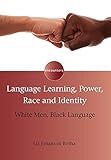Language Learning, Power, Race and Identity : White Men, Black Language / Liz Johanson Botha.
Material type: TextSeries: EncountersPublisher: Bristol ; Blue Ridge Summit : Multilingual Matters, [2015]Copyright date: ©2015Description: 1 online resourceContent type:
TextSeries: EncountersPublisher: Bristol ; Blue Ridge Summit : Multilingual Matters, [2015]Copyright date: ©2015Description: 1 online resourceContent type: - 9781783093854
- 9781783093861
- Language and culture -- South Africa
- Men, White -- South Africa -- Attitudes
- Multilingualism -- Social aspects -- South Africa
- Public opinion -- South Africa
- Second language acquisition -- Public opinion
- Second language acquisition -- Social aspects -- South Africa
- Second language acquisition -- South Africa -- Public opinion
- Xhosa language -- Acquisition
- LANGUAGE ARTS & DISCIPLINES / Study & Teaching
- Identity construction
- Language learning
- Multilingualism
- Race and whiteness
- Social turn in SLA
- South Africa
- isiXhosa
- 306.442/963985 23
- P35.5.S58 B68 2015
- P35.5.S58 B68 2015
- online - DeGruyter
- Issued also in print.
| Item type | Current library | Call number | URL | Status | Notes | Barcode | |
|---|---|---|---|---|---|---|---|
 eBook
eBook
|
Biblioteca "Angelicum" Pont. Univ. S.Tommaso d'Aquino Nuvola online | online - DeGruyter (Browse shelf(Opens below)) | Online access | Not for loan (Accesso limitato) | Accesso per gli utenti autorizzati / Access for authorized users | (dgr)9781783093861 |
Frontmatter -- Contents -- Acknowledgements -- Preface: Autobiographical Origins of This Book -- Introduction -- Part 1: Background -- Chapter 1: The Eastern Cape, Then and Now -- Chapter 2: Life History, Identity and Language Acquisition -- Part 2: The Life Histories -- Chapter 3: Childhood: Intimacy and Separation -- Chapter 4: Rites of Passage: Paths Diverge -- Chapter 5: Adult Life and Work: Language and Power -- Chapter 6: Identity Across Spaces: White Discourse and Hybrid Space -- Chapter 7: Conclusion -- Postscript -- Appendices -- References -- Index
restricted access online access with authorization star
http://purl.org/coar/access_right/c_16ec
This book investigates the strategies and identities of colonials who have learned the languages of colonised people, using the context of isiXhosa in South Africa. While power in language learning research has traditionally focused on the powerful native speaker and the relatively disempowered learner, this book studies the inverse, where elites are the language learners. The author analyses the life histories of four white South Africans who acquired isiXhosa during the apartheid years. The book offers insights into relationships between language, power, race, identity and change in their stories and in the broader context of apartheid and post-apartheid South Africa, with its conflicted history and disparities. This book should appeal to researchers interested in studies of language acquisition, narrative and identity, as well as those more broadly interested in South African history, multilingualism and race studies.
Issued also in print.
Mode of access: Internet via World Wide Web.
In English.
Description based on online resource; title from PDF title page (publisher's Web site, viewed 24. Apr 2022)


